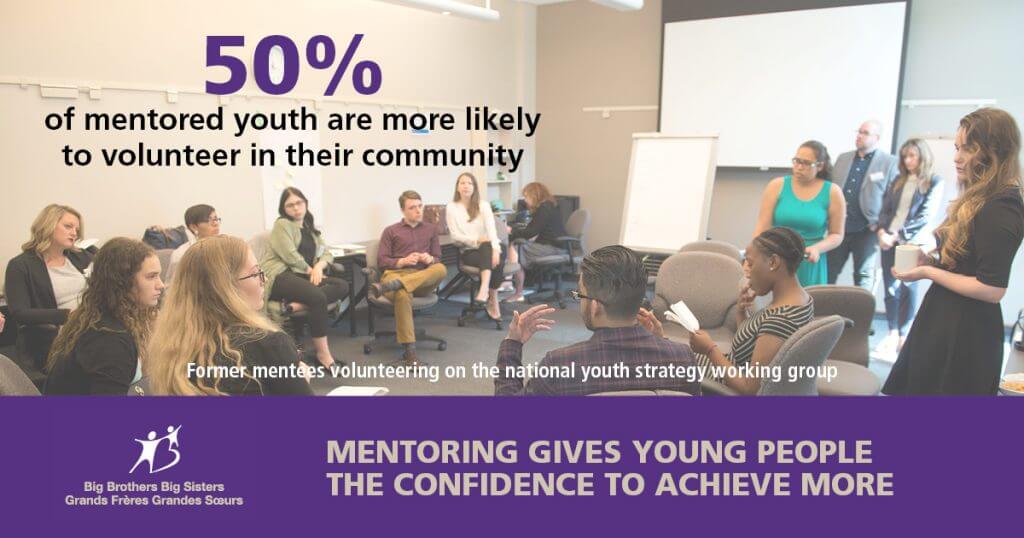A group of Canada’s National Youth Serving Agencies has commissioned an Abacus Data poll on public attitudes to youth civic engagement in Canada. The results reveal that a majority of Canadians believe that youth have too little influence on public policy, however, 7 in 10 believe that young people are not prepared to be civic leaders in their communities.
Youth are increasingly exploring and finding ways to amplify their voices on social issues that matter to them. Despite these efforts, the poll results find that a majority of Canadians, of all ages, don’t believe youth are prepared to be active civic leaders in their community.
“When given the opportunity, young people want to be involved in their community,” says Owen Charters, President & CEO, Boys and Girls Clubs of Canada. “We understand that they don’t always feel ready, but this polling data tells us that there is a lot youth-serving organizations can do to make sure young leaders have the skills and the support to make a difference and have their voices heard.”
The top concerns of Canada’s young adults (ages 18-29) are cost of living/housing, mental health, skill development, and post-secondary education affordability. Canadians from all age groups share these same concerns for youth and think these should be priorities for governments.
“The future has never been more uncertain for young people. They may care deeply about the broader issues facing their society; but fundamental shifts such as rising costs of living and education, the changing workplace and impact of digital technologies are creating more barriers to youth engagement. Although there are growing calls encouraging youth to be the civic ‘leaders of today,’ it is clear that we need to do more to better prepare them for these roles and responsibilities,” says Deborah Morrison, President and CEO, Experiences Canada.
According to the poll data, Canadians think programs and organizations that offer youth these types of skills will have a big impact on preparing them to engage in the public policy of our country. 62% of Canadians believe it is important for youth to interact with their peers through a variety of organizations that help them develop positive social and leadership skills and engage with diverse groups of people.
“At Girl Guides of Canada, our mission is to be a catalyst for girls empowering girls,” says Jill Zelmanovits, CEO of Girl Guides of Canada. “As a girl-driven organization, we provide programs that give girls choice, voice and the scope to take action, all within a peer-to-peer environment.”
Matthew Chater, President & CEO, Big Brothers Big Sisters of Canada, agrees. “Our job is to build confidence in youth and encourage them to speak their truth. It is also our job to create opportunities for dialogue across generations with near-peer mentoring supports. That is how we build an even stronger Canada.”
“Young people are looking for spaces and places to be civically engaged. Canadians trust youth serving organizations to provide these spaces and places where young people’s voices are heard and valued,” says Sharif Mahdy, Executive Director of The Students Commission of Canada.
The research says we should be working towards preparing youth for civic leadership by increasing their opportunities to develop job-ready skills and creating experiences where they can interact with people from different age groups and backgrounds. These efforts will have important implications for public policy. These findings also echo the experiences of youth serving organizations with global reach: “By providing youth with job skills and opportunities for peer-to-peer leadership – in Canada and internationally – the United Nations Association in Canada has gained unique insights on what youth need to be civically engaged”, says Kate White, President & CEO of United Nations Association in Canada.
“Young leaders engaged in community-building activities at YMCAs across the country respond openly and knowledgably when they’re engaged in the conversation,” says Peter Dinsdale, President and CEO of YMCA Canada. “We recently hosted a virtual youth town hall and the themes that emerged from that gathering were consistent with the opinions reflected in the poll. These are concepts that will inform the National Youth Policy that’s currently under development.”
Canadians of all ages are recognizing the leadership potential of young Canadians and the issues that matter to them. As more youth are supported, engaged, and invited to participate, their influence on public policy will continue to grow.
Poll methodology
The survey was conducted online with 2,000 Canadians aged 18 and over from February 16 to 25, 2018. A random sample of panelists were invited to complete the survey from a set of partner panels based on the Lucid exchange platform. These partners are typically double opt‐in survey panels, blended to manage out potential skews in the data from a single source.
The Marketing Research and Intelligence Association policy limits statements about margins of sampling error for most online surveys. The margin of error for a comparable probability‐based random sample of the same size is +/‐ 2.2%, 19 times out of 20.
The data were weighted according to census data to ensure that the sample matched Canada’s population according to age, gender, educational attainment, and region. Totals may not add up to 100 due to rounding.
The following Canadian national youth serving agencies commissioned the poll:
Big Brothers Big Sisters of Canada
Boys and Girls Clubs of Canada
Experiences Canada
YMCA Canada
Girl Guides of Canada
The Students Commission of Canada
United Nations Association in Canada
For more information contact:
Jody Lundrigan
National Director, Communications and Marketing
Big Brothers Big Sisters of Canada
Jody.Lundrigan@bigbrothersbigsisters.ca
1-800-263-9133 x 49
David Coletto
CEO, Abacus Data
david@abacusdata.ca
1-888-757-1119

